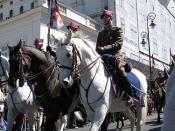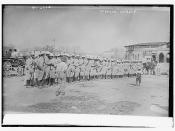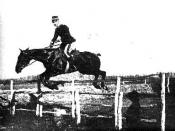Horsed cavalry and horsemanship in general played a tremendous role throughout human history. Our life might have been different without those magnificent animals.
It is indeed extremely ironic that the horsed cavalry ultimately almost reached its perfection when it was finally relegated to history.
After ten centuries of battlefield dominion the cavalry started loosing it's supremacy around the 14th century, when infantry acquired the deadly long bow and the spectacular Swiss pikeman almost eliminated the cavalry from the Western battlefields. Horsed warriors were mostly to be found in the tournaments which were just a sport spectacle detached from military reality. However it was at this point that European riders (finally free from heavy lances and even heavier shields) developed an interest in scientific horsemanship and science of equitation.
This new school of equitation produced a rather bizarre and extremely specialized animal, a "pleasure horse", object of art of manege, a big heavy creature, over bent and slow, which was able to carry men in full plate armor and perform various feats of equine athletics, known as "airs above the ground".
Despite its aristocratic esthetics, this kind of horse proved to be extremely useless in real battle and almost no cavalry horses could have enjoyed the specialized training that would make them into a "pleasure horse". Yet, it was the military ideal during the Thirty Years' War.
Nevertheless there was another school of equitation, a more natural and practical one, which was represented by the horseman of Turkey and Eastern Europe which never faced the deadly arrow hail of the English long bow and did not use the heavy full plate armor.
The "Turkey Fashion" consisted of riding with bent knees, using short stirrup-leathers. Turks and Eastern Europeans never gave any conscious thought to for collection or center of gravity; they...


